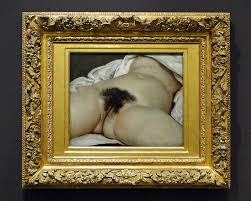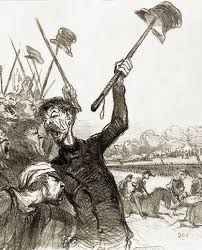Translated by SamFanto with the help of the authors from this.
“Workers! Remember – flattering the Great shows a despicable lack of principles, but flattering The People is criminal!”
– Flora Tristan, Letter, March 29th 1843
It’s tempting, is it not, to appeal to “the People”? To begin with, the term is fashionable. Sure, it’s not the first time in history, but given that it seems to be asserted everywhere, it must be important to defend it.
What’s more, it’s romantic, the People. It’s exciting. It’s impressive. When one calls upon the People to rise against the Elites, for example, it sounds so vibrant – even though it does nothing more than drag down the deafening dead weight of all the revolutions and the social movements of the past.
We remember the victories of the “People” cutting off kings’ heads, the “People” building barricades, the “People” united against the injustice of the high and mighty. We forget that the same “People” are also those who massacred, in turn, Protestants, Muslims, Jews. That they howled with joy at public executions (are we now so far away from that?). That they kept the women out of their triumphant parades. That the “People”, in short, not only have never been united, but even that the overwhelming majority of them have never missed out on the chance to crush the seeds of revolt under their feet.
It’s said that yesterday is past, and so we speak, in a haphazard sort of way, of the People of the countryside, those of the sea, of People in vests or scarves, of the sovereignty of the People, angry People, People in the street, but also silent People, of People on the left and People on the right, of the little People, of the representation of the People, of forgotten People… Each with their own notion of People – there’s something for everyone!
But what does it matter? The People is something to be! It is strength, justice, the future. In short, it is the Good, and with all theses images, it is also the Beautiful. It is so good and so beautiful that everyone’s competing to prove how much they’re part of it. It’s a delight to belong to the People. The academics hide their diplomas, the politicians hide their power, the bosses hide their fortune, and everyone marches together, hand in hand – it’s good, isn’t it, to be among the plebs! Now it’s my turn – I belong to the People too, or at least my parents do. It’s so important to belong!
And yet, if we scratch and scratch at it, it itches. We are the People. Great. But which one?
The People of the workers? And the bosses who can only exploit, do they not work as well? Are they part of the People too? Yes for the “small” ones (merchants, farmers, craftsmen…) but no for the bigger ones? According to what scale?
The People of the poor? Very well, but let’s make it clear: who are the poor? Those who “benefit from the system”, for example, are they the “bad” poor? A bourgeois in ruin, does he belong to the People? A prole who eventually bought a house with a garden and a huge 4X4 after 30 years of over-work, does he still share the anger of the People?
We should set some boundaries, agree on some criteria of belonging to the People. For example: to have no power over anyone. Or not being a landlord. Or to be in favor of emancipation and freedom for all individuals.
We should also be careful as to what the People fights against. For example: against all the men and women of the State, of the Clergy, of Capital (and when we say “fight”, we include all the physical means to do it). Such was one of the meanings of the word in the times of the Commune and the social revolts that followed it, before the reactionaries did away with that meaning once and for all…
Without it, without criteria, everything everything goes, everything melts into the pot of the People, without anyone knowing who exactly has the right to be there or not. Those who revolt march along with those who are revolted by any kind of revolt, the (real) poor march along with the other (a little bit less real) poor that they hate, the workers accompany their bosses and liberal managers… Since we see everybody accepted and everything excused within the popular mass, we must ask the following question: what makes the unity of this most brilliant and most magnificent People?
“We” live on the supposedly same land (be it thousands of kilometers wide), “we” speak the same language (the newly arrived are rarely taken into account), “we” live under the same laws… Let’s be clear: is the unity of this distinguished People not built simply and purely on its national borders? For if we look close enough, and if we listen to its spokespersons, there are indeed geographical boundaries delimiting our People – our workers and our poor! At times you only need to walk a few meters to become someone else’s workingman, someone else’s poor. So now, it becomes all different, for the People suddenly becomes much tighter when you’re on the wrong side of the fence.
You will say that we’re nit-picking. But if you insist on spray-painting it on banners and shouting it through megaphones, you may as well try to know what you’re talking about.
For if it’s not really the People of the workers, nor the People of the poor, nor even the People of the disenchanted, what’s left of this united front if it’s not a way of standing against all the others? Even if for several centuries the French People have thought it possible to represent values that are both “theirs” and “universal”! The flagrance of this contradiction is commensurate with the civilising barbarism that it sent out a bit throughout the world.
It is most probable that there is little – or that there is nothing – that differs the People fighting its Elites and the same People fighting another People in front. We fight against the political and the financial Elite, but we are happy to vote for the masters that represent us (or we’re disappointed that they do not represent us enough). We fight against a life of toil, but we want to save our companies working in our country where they provide our jobs. And in the same movement we drown in oblivion the vast People of the massacred and the exploited, who bend their backs at “our” borders as well as everywhere else – all for the same reason of being instruments of their masters and not the masters of their lives.
And all these funny questions of belong are much harsher when you’re unfortunate enough to actually be a worker and/or poor. These questions are hardly a matter of life and death for the diplomats, the businessmen, the artists and the academics. Now, the Romanian, Ethiopian, Chinese workers, whether they live in Romania, Ethiopia, China or France, are they part of “our” People since they are workers and/or poor?
No matter how deep we look into the popular swamp, the People seems to remain a simple double of the Nation (even if it is “unconsciously” or even “innocently”). This is why it can’t stop swinging between claims of Popular sovereignty and plain xenophobia – the two being altogether compatible. As long as the artifice of such national unity is not smashed up and trampled underfoot, the People will always defend their “kin” to the detriment of all the others, their noses glued to their own navel.
But it is reassuring, a navel. It helps to know where you come from. It also helps to know where you’re going. It is only normal that everyone seeks a community to snuggle up to, a group to belong to. When one is alone, how vast the world is! How senseless life seems!
The double advantage of being in a group is that, on the one hand, our particular role is fully acknowledged and our singular responsibility wholly dissolved. How practical!
Being part of the People is, also, a question of belonging. I was born in this part of the world, I speak this language, I’m part of it. My everyday acts, my aspirations, the shallowness of my braveness and the greatness of my cowardice have no importance at all. By belonging to a People, I bathe in its aura, I take some of its glory, and I can comfortably disappear with no responsibility whatsoever. I am already someone (actually, something). I take what the State has chosen for me long before my birth: my nationality, the most normal way of living in this society, the holidays I’m supposed to celebrate, the “duties” that accompany the “rights” which I won’t take the trouble to question. I don’t ask myself if I really want to be part of this People, the whole of it, once and for all, forever.
It seems that in these marvelous times, one should absolutely get an identity of some kind to hold one’s head up high. You should claim you belong to this or that group – often precisely the one that you never had the chance to choose in the first place – in order to conquer the rights that were so unjustly taken away from you. Thus, personal isolation is confused with the race for collective grievances – grievances that may give, even fleetingly, some sense to life, a dignity to be earn. But, alas! Fulfillment as a member of the social fragmentation knowingly produced by this society can only slip through one’s fingers – for this society is known for putting us in different boxes all the better to smash us all up.
The People is no exception. Its defenders tell us with no small pride that the People does not think, the People acts. Here again, we must disappoint you. The People, in and for itself, is nothing. It does not think. It does not act. To be completely honest, it doesn’t even exist. Like all phantoms of unity, the People is but a thread that ties us to our servitude. What is or is not the People, is fully determined by those who hold its reins. Not only to recuperate it, as all the rival camps like to accuse each other of doing, but also to show the direction, to guide from below, against the darkness and towards the light. Nothing would be more logical: the very idea of People’s sovereignty – once more in fashion these days – can come to being only through political representation; a herd looking for master is the only People there is.
 The Origin of the World, Gustave Courbet, 1866 (abolition of God?)
The Origin of the World, Gustave Courbet, 1866 (abolition of God?)
In 1871, Gustave Courbet proposed to abolish God by decree. Not the clergy, not religion, not the Church, but God himself. If we all want to have air to breath today, it may be necessary to get rid of the idea of the People – not just populism, which simply grows in that fertile, phantom ground, not even of nationalism, which reduces it to the skeleton of itself – but the People, the good ol’ People itself.
Against national idiocy, we must more than ever assert that individuals may find each other beyond national borders, giving warmth to each other – because nobody is self-sufficient – to smile and share a common effort. For us, this effort must go against everything that allows a human being to give an order to another, and against everything that makes the latter obey.

Leave a Reply